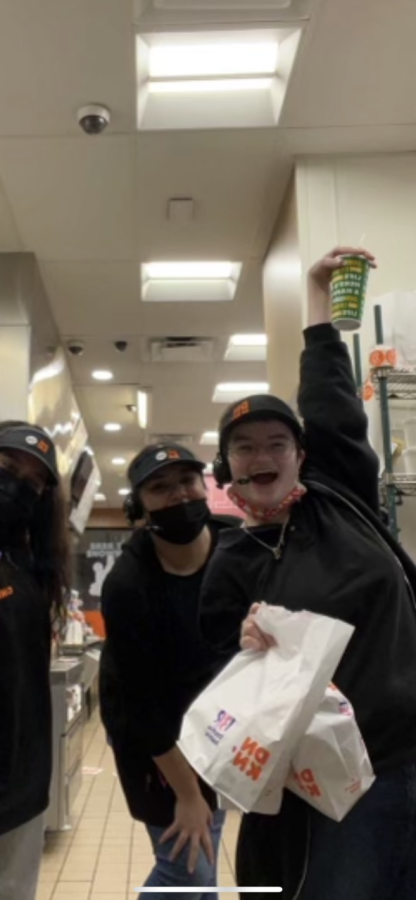What is it like working in customer service as a high school student?
Dunkin Donuts’ high school employees just after quitting
December 16, 2021
Working in customer service is never black and white. With all sorts of customers, managers, and staff—some rude, some not, some polite, some not—the job can vary from person to person. Some places have more stressful, vigorous, and toxic environments, while others might be laid back with more minimal amounts of work and kinder customers (or maybe even a mix of the two). Of course, a known fact is that customer service can supply workers, teenagers especially, with necessary life skills such as self-advocating and social skills.
“I realized that I needed a lot of life skills because you can’t work when it’s just based on school knowledge,” Sneha Ghosh, a junior at Neuqua, says. “There’s a lot of speaking up for yourself and understanding how you work because not everyone works like you.”
Being in a work environment and working in customer service can help teach teenagers how to function under stress in the workforce, how to work with others, and how to approach and help customers in a way that is beneficial to both customer and worker. It helps teach time management by helping high school students learn how to balance work with homework or free time.
“If you need time off, you’re gonna have to tell them earlier rather than later, so you have to plan ahead to know when your assignments are due, when you have tests, when you have finals, so you really just have to know,” Ghosh notes.
Despite this, working might also be too stressful and morally downgrading. “I have pretty good experiences with customer service and I try to be nice to everyone, but every once in a while, there’s that one person who, no matter how nice I am to them, they’re still going to be upset with me, which just happens, but they kind of do ruin the mood for the next half hour. But even if that happens, I still try to be really nice to people, and I try to make people’s days and just try to make it positive,” explains Maddie McGinnis, another junior.
It might be beneficial for teenagers to be exposed to behavior like this while they’re younger since it will help them understand how to deal with and diffuse the situation as best as possible. However, it can also be a factor in bringing up their stress levels as high school students, where assignments and tests might be impacted by the behavior of others.
“I feel like people are so caught up in their own world that they don’t realize [that] we are people and you can’t just yell at us, and getting mad won’t make things go faster,” Neha Kamat, a junior at NVHS who works in a pharmacy, says. “We do a million things at once and are basically running the pharmacy as teenagers.”
Customer service can be a learning experience, socially and otherwise, but it can also be an emotionally taxing experience that forces teenagers to overwork themselves and can affect their lives in negative ways. Many people “don’t understand that you have things to do, and they’re not the only person that you’re serving”, Neha also says. It is important for customers to remember that customer service workers are also human and should be treated with the same amount of respect as anyone else, so, after gaining these perspectives from multiple different people, it might be easier to put more thought into how we speak to them and treat them.


